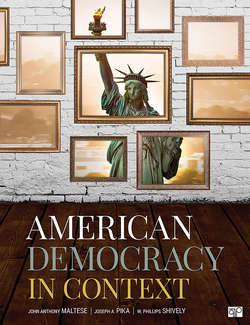Читать книгу American Democracy in Context - Joseph A. Pika - Страница 103
На сайте Литреса книга снята с продажи.
Concurrent Powers
ОглавлениеSome powers belong exclusively to the national government (such as the power to declare war). Others belong exclusively to the states (such as the power to establish local governments within a state). However, some powers are shared between the national government and the states. These are known as the concurrent powers (see Table 3.3).
Table 3.3
The power to tax is one example of a concurrent power. Although there are some limits on what types of tax each level can impose—states cannot impose a tariff (an import tax) without the consent of Congress and the federal government cannot impose a tax on real estate—both the national government and the states can impose excise taxes (non-property taxes, such as taxes on payrolls, estates, gasoline, and cigarettes). For example, Congress raised the federal tax on a pack of cigarettes from 39 cents a pack to $1.01 a pack in 2009.11 In addition to this federal tax, individual states are free to add their own tax on cigarettes and to choose their own tax rate. As of 2019, the states of Connecticut and New York had the highest rate ($4.35 per pack) and Missouri had the lowest (17 cents per pack), with the District of Columbia having the highest rate of all ($4.50 per pack).12 Thus, the cost of cigarettes—and gasoline and alcohol and many other goods and services—can vary considerably from state to state and even from county to county and city to city, since both can also impose taxes. For example, the tax rate on cigarettes in Illinois in 2019 was $2.98, but Cook County added another $3.00 tax, and the city of Chicago (which is in Cook County) added another $1.18, making Chicago the most expensive city in the country to buy cigarettes ($7.16 in state, county, and city taxes alone).13
Other concurrent powers include the ability to establish courts, borrow money, and charter banks and corporations. Once again, however, the precise line between exclusive powers and concurrent powers can change over time, largely because of changing interpretations of constitutional language by the Supreme Court.
